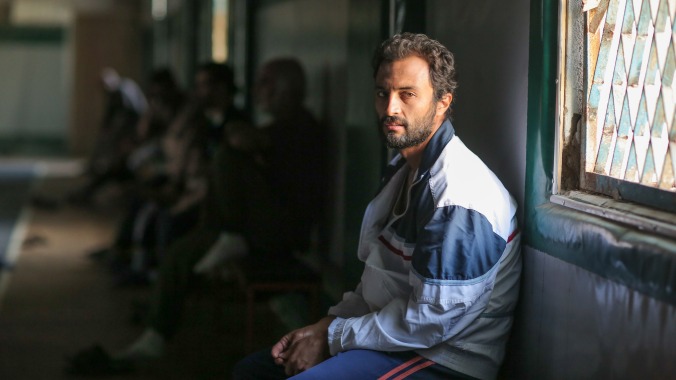Asghar Farhadi tackles the milkshake duck phenomenon in his thrillingly complex A Hero
This might be the writer-director's best since his Oscar-winning A Separation


There are no villains in the exquisitely constructed, thrillingly layered dramas of Asghar Farhadi. Only imperfect people, scrambling to escape the legal and moral crises that have ensnared them, to reconcile their own self-interest with their bruised, embattled notions of right and wrong. Of course, it follows that if there are no real villains in his movies, maybe there are no real heroes either. The Iranian writer-director puts that question front and center with his terrific new film, whose title teases an exploration of nobility itself—a concept that Farhadi, master dramatist that he is, will turn inside out several times over through a characteristic maneuvering of our sympathies.
It’s with great efficiency that A Hero introduces its title character and communicates his dilemma. Glimpsed, early on, ascending an endless flight of stairs—a shrewd visual representation of the daunting uphill climb of his present circumstances—Rahim (Amir Jadidi) is an incarcerated calligrapher out of prison on leave for two days. It’s an unpaid debt that landed him behind bars; as we learn, his troubles began when a professional partner skipped town with the money the two borrowed to start a business.
Jadidi, the actor who plays this beleaguered man, has a big, goofy grin and gregarious manner. He projects an inviting optimism despite his dire situation, and we’re rather immediately on the character’s side. Farhadi builds the whole movie, piece by piece, around this smartly ingratiating performance.
Rahim is determined to pay off his debt, somehow, someway. And to that end, he’s been dealt—as if by cosmic good fortune—a possible lifeline. His girlfriend (Sahar Goldust), who he intends to marry after serving his sentence, has found a lost handbag containing a number of gold coins. Can he use the money to settle with his creditor and get out of prison? Though Rahim considers this course of action (and even has the coins appraised at a pawn shop), he ends up doing something more seemingly noble: He returns the bag and its valuable contents to a woman insisting she’s the rightful owner. It looks, from a distance, like the epitome of selflessness, of doing the right thing even when the wrong one would have benefited him more.
This is where A Hero starts twisting the knobs. The film comes on like a simple moral parable, then quickly reveals a more knotty philosophical design. (Call it the Farhadi principle.) Rahim’s honorable act makes him the apple of the public eye; soon, he’s on television, featured in a human-interest story about his choice, soaking up the admiration of his neighbors. But were his motives really so pure? The man he owes, Bahram (Mohsen Tanabandeh), doesn’t think so. The film ingeniously sets up this character as the miserly source of Rahim’s woes, as unsympathetic in his refusal to forgive the debt as our protagonist is sympathetic in his plight to settle it. Yet there’s an undeniable logic to his objections, and a growing understanding of his side of things, how he’s suffered too. Again, there are no villains in a Farhadi movie.
Should Rahim be celebrated just for doing what any decent person would? As the film slowly reveals, there may be some shrewd calculation behind his apparent altruism: Since the gold coins couldn’t account for his full debt anyway, maybe it was to Rahim’s advantage to do the “right” thing—a theory that gains credence once he attracts the attention of a charity that starts fundraising on his behalf. Also, there’s the matter of Rahim’s young son (Saleh Karimai), who has a stutter and some unspecified learning disabilities, and who Rahim trots out on stage in what looks suspiciously like a blatant bid to pull at the public’s heartstrings. “No good deed goes unpunished” is a phrase many threw around when A Hero hit the fest circuit, but part of the movie’s brilliance is in how it questions the very concept of a good deed.
Make no mistake: Rahim’s decision has unforeseen consequences. They spiral out from a series of compounding deceptions, starting with the little white lie of who really found the money and when, and growing from there until several parties are trapped in a vortex of falsehoods and misconstructions. This is a Farhadi speciality: His Oscar-winning A Separation was a domestic drama that morphed gradually into an engrossing legal thriller in which nearly everyone on screen was hiding some crucial bend in the truth. A Hero might be his most morally, dramatically complex film since that masterpiece. It has a comparable spider-web intricacy of plotting, introducing one complication after another, paying off every by-all-appearances minor detail, like what phone number Rahim puts on the flier announcing that he’s found the missing bag.
As Farhadi keeps pulling more and more characters into Rahim’s increasingly fraught predicament, A Hero reveals the full scope of its interests. It’s a drama, in part, about the injustice of modern debtors’ prison, and also the by-no-means-specific-to-Iran cycle of internet valorization and swift backlash. (It’s no joke and no stretch to suggest that the director has offered his own take on the milkshake duck phenomenon.) Most fundamentally, this is a film about a widespread national obsession with honor and “goodness.” Rahim’s story, his ballyhooed gesture of generosity (which may, in fact, have been a roundabout form of self-preservation), is an investment that everyone from the press to the prison to the charity wants in on. For all that Rahim’s troubles can be traced back to money, the true currency that drives the movie is reputation—the coveted perception of uprightness.
That’s all between the lines, though. Farhadi has long insisted that his films aren’t “political”, which is one reason, perhaps, that he hasn’t faced the kind of government suppression visited upon fellow countrymen Jafar Panahi and Mohammad Rasoulof. In A Hero, he once again nestles deeper themes within the cracks of his carefully developed dramatic situation, never allowing any agenda to didactically eclipse the relatable conflicts between his characters—including, in this case, a man whose perceived nobility shifts as often as his misfortune, keeping us guessing at his intentions. But just as it’s possible to see the wheels turning behind Rahim’s winning smile and hangdog affability, looking closer here reveals the true target passing into Farhadi’s crosshairs. Maybe there is a villain in his work, after all. It’s society itself.